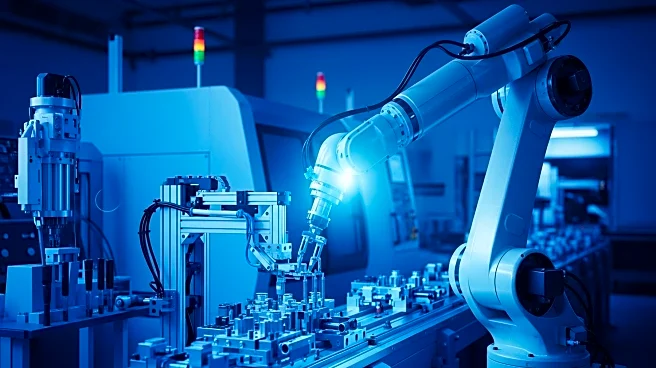What's Happening?
Blue-collar industries, such as plumbing and HVAC, are increasingly adopting AI tools like ChatGPT to enhance productivity and reduce costs. Companies like Oak Creek Plumbing & Remodeling in Wisconsin are using AI to automate tasks such as invoice creation and problem-solving, allowing workers to focus on hands-on tasks. AI tools are also being used to streamline administrative processes, reducing the need for office staff. This integration of AI is helping businesses take on more projects and improve service quality. A survey by Housecall Pro found that over 70% of tradespeople have tried AI tools, with younger professionals leading the adoption.
Why It's Important?
The adoption of AI in blue-collar industries is reshaping the economic landscape by increasing efficiency and reducing operational costs. This trend allows businesses to allocate resources more effectively, potentially leading to higher revenues and improved service quality. As AI automates administrative tasks, companies may reduce their reliance on office staff, impacting employment in these roles. The integration of AI tools is also influencing educational institutions, which are updating curricula to prepare students for future job markets. This shift towards AI-driven processes highlights the growing importance of technology in traditional industries.
What's Next?
As AI continues to be integrated into blue-collar industries, businesses may further streamline operations and enhance service offerings. Companies might invest in more advanced AI tools to improve efficiency and reduce costs. Educational institutions will likely continue adapting curricula to include AI training, ensuring graduates are prepared for evolving job markets. The increased use of AI could lead to changes in employment patterns, with a potential reduction in administrative roles. Businesses may explore new opportunities for growth and expansion as AI tools enable them to take on more projects and improve service quality.
Beyond the Headlines
The integration of AI in blue-collar industries raises questions about the future of work and the balance between technology and human labor. As AI automates tasks, there may be ethical considerations regarding job displacement and the impact on workers' livelihoods. The shift towards AI-driven processes also prompts discussions about the role of technology in traditional industries and its potential to transform business models. As companies embrace AI, there will be ongoing debates about the implications for employment, education, and economic growth.








